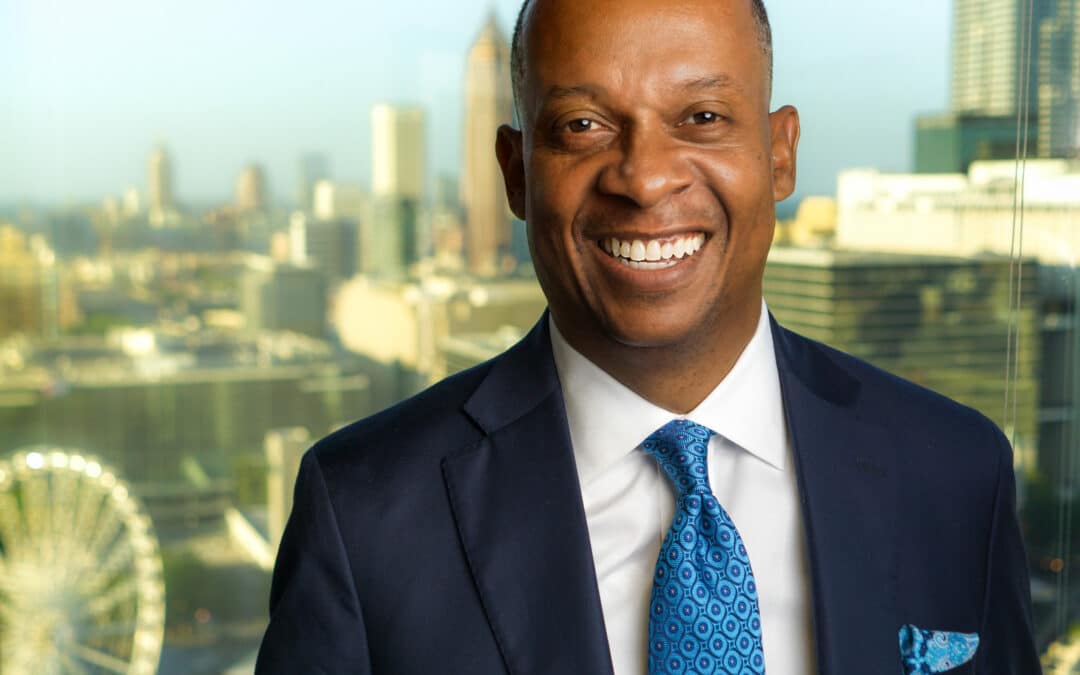T. Dallas Smith is one of the most influential commercial real estate executives in the lucrative Atlanta market, and his career personifies the concept of the American success story. He began his commercial real estate career in 1982 at Atlanta Air Center Realty and in 1989 became the first Black broker at Cushman & Wakefield’s Atlanta operations. He launched the brokerage division for H.J. Russell & Co., an influential Black-owned construction and management firm, and in 2006 opened his T. Dallas Smith & Co., specializing in tenant representation.
Smith recalls his remarkable career in the new autobiography “In the Black: Changing the Dominant Nature of the Commercial Real Estate Industry” (published by Forbes Books). WRE News had the pleasure of speaking with Smith regarding his book and his views of the commercial real estate sector.
What inspired you to create this book?
I think it’s important that people really understand how and why we do what we do. Herman Russell wrote a book when was in his eighties, and he died in his eighties. Herman was a guy I knew who had at least 12 books in him, but he only was able to get the one book. And I told myself when I turned 60 I better have this book out – because I feel like I have more books than me.
For the benefit of those unfamiliar with Herman Russell, what influence did he have on you?
He was an icon in construction. He started a company from nothing and grew it to one of the largest Black-owned construction companies in the country. I came out of his shop, and a lot of guys in real estate – particularly in this area – came out of his shop are doing extremely well, because he was a hell of a role model for us.
Your book offers a fascinating look at the barrier breaking work that you did in the 1980s. What is what is the state of commercial real estate today in terms of Black representation of brokers?
I’ve been in the business now for 41 years, and I would say when I got into the business we probably had 1% of the industry. Now, I’d say the number is 3%. In 41 years, we’ve moved two points.
Well, that’s not really a lot of progress. What went wrong and why don’t see more Black brokers in commercial real estate?
This is a very incestuous business – with a lot of folks who are in the business, their families are the ones who really control the industry in a big way. And if it’s not the families, it’s the same schools and the same country clubs.
And it’s an industry that many people never even heard of, so a lot of people like me hadn’t even been exposed to this thing called commercial real estate. Whenever I used to tell somebody I was in the real estate business, they’d tell me they were thinking about buying a house. Well, that’s not what I do – but that’s the thing that we’re most familiar with.
And then, quite frankly, there is the prejudice of wanting to keep people out or just not wanting to bring people in, however you want to say it. That’s another reason why I wanted to write the book – the book would expose people to a guy who looks like me, and possibly a little kid who looks like me reads this book and finds out there’s a whole another industry he never heard of that could possibly free up his family and make him financially strong.
I tell people I didn’t sing, I couldn’t dance, I didn’t play sports. So, I backed into this industry, and I am so grateful that I have still everyday wake up excited to be doing this thing called commercial real estate.
And you’re doing your own thing at your own company. What inspired you to go out on your own and to start your own company?
I worked at one of the big shops and I was the first Black broker Cushman & Wakefield in Atlanta – and they were owned by the Rockefellers at the time, which brought a whole different air to it. The reality of it back then was if you didn’t come from money, you didn’t work at Cushman & Wakefield.
And one of the things that I witnessed was the competition internally, with everybody having the same business cards but trying to slice each other’s heads off, which is something I thought was not the proper thing to do internally – but it also was a very bad signal for any clients that we were representing, because the client would think that we’re all on the same page because we all have the same business card.
In the book I describe this industry as full tigers, and tigers hunt solo – they don’t hunt as a pride. That’s one of the reasons the logo for my company was a lion – I wanted to start a company that was really not like anything else I really saw in the industry, but where people are really working together. And if it takes one person, two people, 10 people to get a deal done, that’s what we’re going do – and we’re going to all work collectively as a team. That was one of the things that I didn’t see happening in the marketplace and I felt like I could help make that happen.
What is about Atlanta that makes it such a special market for you?
You see a lot of the companies heading this way for talent and for diversity. There are not a lot of places like the City of Atlanta, and I always tell people that this is the place where Dr. King was born – and this is also the place where we’ve been dealing with issues of race early on. Even when Dr. King was assassinated, there was no riot in Atlanta, and that was primarily because White business leaders and Black business leaders had been having hard conversations early on what they call the Atlanta Action Forum. In fact, if you look at Birmingham and Atlanta, at one time Birmingham and Atlanta were almost neck-and-neck in size. But the big differentiator was diversity – while Alabama had dogs and water hoses on black folks, we were having conversations here trying to make things work, and that’s still in the DNA of the city.
I’m born and raised in Atlanta. I’ve traveled the world and I’ve seen that’s one of the biggest differences. And also, here we see Black businesspeople doing major things – it’s not an anomaly for us, it’s a way of life.
You said you have some more books in you. What are your next book projects going to be?
I’ve got one book in my head around the issue of Branch Rickey, who was the owner of the Dodgers. He was the one who intentionally hired Jackie Robinson to change baseball. When I asked people about Jackie Robinson, everybody knows about Jackie Robinson but no one really knows that much about Branch Rickey until I explain who he is. And what intrigues me about Branch Rickey was he was a White man who was intent on changing baseball and to make it more diverse.
I think lessons can be learned from Branch Rickey in every sector of America as it relates to diversity and coming in with a spirit of intentionality. I really want to do a deeper dive around Branch Rickey and the lessons that he went through and the pains that he went through to make that happen.
I’ve got a few Branch Rickeys in my life and we have conversations about solving the world’s problems. It starts with the conversation, and so that’s why I’m so eager to speak with you because it’s important for people to be exposed to both sides in terms of how we can work together and really make this a journey of reconciliation while using real estate to do it.

















Very well said! I admire you and what you’ve done, excellent job. In my 33 years as a commercial RE broker I wish I’d have met you! Fascinating, thank you.
Thank you Dallas, will be reading your book very soon! I’m also a native of Atlanta, have family and friends there and still visit often plus I’ve spent my entire working career in the real estate business although my focus for the past 30 years has been on residential real estate here on Hilton Head Island. It’s always gratifying to read the success story of someone who gives ample credit to a mentor like Herman Russell, as Mr. Russell’s accomplishments and influence are well known to me. I’ve also been blessed with the good fortune to have been influenced by many mentors and like you, I never want to forget where I came from and how I got here! Much success to you in the future and hope to cross paths with you some time in Atlanta or Hilton Head Island!
Does the book discuss how Atlanta’s industries have changed over time in regards to the commercial sectors and what’s now available for sale or what might be valuable or developing in the coming years?